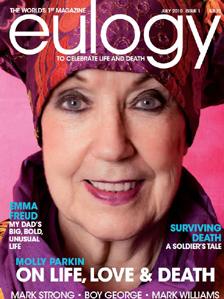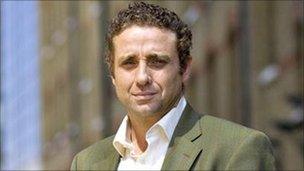On death's doormat
- Published

A magazine and website have been launched which discuss the topic of death and dying, using a mixture of celebrity culture and real-life experiences. But are the characteristically reticent British ready to talk about their mortality in this way?
For something that happens more than 1,000 times a day in the UK, death may appear to be under-represented as a, if you'll excuse the marketing jargon, consumer issue.
Browse through the magazine racks of a well-stocked newsagents and all the other big life events are catered for. There are periodicals dedicated to seminal life events such as marriage, parenthood, buying a new home as well as other life stages and niche interests.
Jim Thornton is hoping to add his journal to this roster of titles. Called Eulogy, it is a newly-launched magazine and website that discusses death, dying, and the practicalities faced by those left behind. It doesn't sound like the sort of publication one would leap up from the sofa and tear open on hearing it drop through the letterbox each month.
Mr Thornton, a 47-year-old creative director of a communications company, says he was prompted into bringing Eulogy to life after suffering tragedy in his own family.
"Both my in-laws died in separate car accidents within 14 months of each other. This made me realise that there's no central resource for support, comfort or advice. Arranging a funeral is like arranging a wedding, only you have one week in which to do it, and you're not emotionally prepared for it."
Cultural influences
Mr Thornton talks about the need for the "cultural zeitgeist" to allow a publication which discusses mortality to become palatable among the public.
He cites Princess Diana's death as something of a milestone and mentions recent examples, such as the extended coverage given to reality star Jade Goody's funeral, actress Natascha McElhone writing a book about her husband's sudden death, and actress Sheila Hancock discussing the passing of her husband, the actor John Thaw.

Eulogy's first edition contains interviews with several celebrities
And he describes the regular tributes paid by ordinary members of the public, to repatriated soldiers killed in Afghanistan and whose bodies pass through Wootton Bassett, as "quite astonishing".
He adds: "People are talking about death in a much more open and less morbid way.
"The baby boomer generation lived how they wanted to live, and I suspect they will want to die how they want to die, although we will not advocate any particular form of dying."
He also believes that the blending of the nation's population with other cultures has shifted the UK's perception and attitude.
"I think it's one of the advantages of multi-culturalism, as it's loosened up how people treat death and approach funerals.
"Ghanaians, for example, have an industry where they decorate coffins in things the deceased were passionate about. We're seeing influences of that over here now, I've heard of a man having his gravestone as a BMW complete with parking ticket.
Funeral streaming

Jim Thornton started Eulogy after experiencing two sudden deaths in his own family
"As British we were stiff-lipped, but now we're encouraged to celebrate life, and not the death."
The first edition's editorial contains several interviews with personalities such as Emma Freud and Molly Parkin, but Mr Thornton says content will become a mix of "personality, real life, issues and debates".
The magazine is intended to drive people towards the website, which will be free to browse, and is being developed in stages.
Eventually, the site will have the ability to stream funerals live, so people abroad can see a loved one laid to rest, he promises.
There will be advice on arranging funerals, discussions on legal matters surrounding someone's will, and also a "online vault" where people can place photos, videos and messages in tribute to a loved one.
Professor Tony Walter runs a masters degree in Death and Society at the University of Bath.
He says while Eulogy is the first monthly magazine on the topic of death he has heard of, death itself is not the taboo that many think of it as.
Afterlife discussion
He refers to a study he conducted with colleagues in the mid 1990s, which examined the coverage of all the major UK newspapers.
"About 50% of the stories and photographs were about death, and this will go up at a time of a crisis.
"Death is not a taboo subject among the media or in society, but the question is whether it's something that happens enough to an individual to bring in regular custom for a magazine. It's difficult to predict whether its content will be helpful.
"In the 1990s I wrote a book about afterlife beliefs, and found that people couldn't stop talking to me about that topic, whether it was about the concept of heaven or reincarnation.
"But I later wrote a book about death itself and people weren't so keen to talk about that."
The Reverend Simon Heron is a Church of England priest in Frindsbury, Kent. He posted on Twitter that, having seen the launch edition of Eulogy, he suspected "the first issue may well be the last".
Why the scepticism? Mr Heron doubts that "society is ready for something like this" because, he believes, dying is not topic that people want to look forward to.
"I don't think enough people talk about death," he says. "I do plenty of funerals and I'm astounded at how many people talk about death after it has happened to a loved one, but not before.
"I was no more convinced when I put [the first edition[ down. I couldn't see who they are trying to market it to."
'Changing attitudes'
But Tom Memery, development director at Omega, the national association for end of life care, says having a magazine covering "these difficult subjects" was a "positive move for society".
"Any new initiative that tackles issues around death and dying is to be supported," says Mr Memery. "I think the advertising in the magazine could be a useful resource. Just as parents looking for a nanny might read The Lady, there may be some services people can find here.
"But I find it hard to contemplate who might buy it - 500,000 people die in the UK every year and people are more willing to address bereavement when it happens to them, but I can't see them dashing to the newsagent to buy this magazine.
"Would people want to read this when they were distraught?"
Mr Memery says he would welcome more mainstream media coverage of death and dying, such as national newspapers discussing these "really challenging subjects".
"Only then do I think we will start to change attitudes."